A K-9’s Courage
Story by Megan Myers, CVMBS Communications
Search and recovery dog Remington is now enjoying retirement thanks to the care he received from the Small Animal Hospital’s Oncology Service.
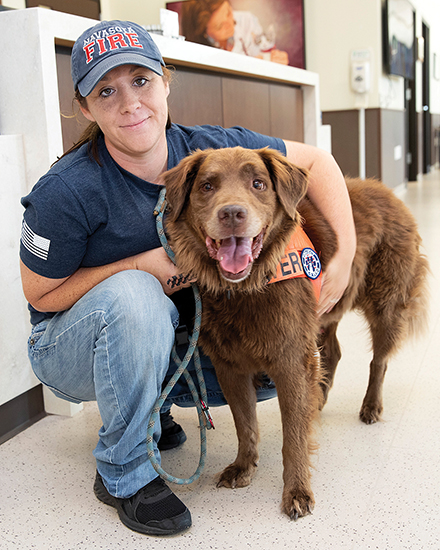
It was a training day like any other when Rachael Crivelli noticed that her dog Remington, a search and recovery canine for the Navasota Fire Department, developed a limp after slipping during an agility course obstacle.
Remington was still limping two days later, but Crivelli’s local veterinarian was unable to provide a diagnosis.
Soon after, Crivelli met Dr. Deb Zoran, a professor at the Texas A&M College of Veterinary Medicine & Biomedical Sciences (CVM), at an urban search and rescue (USAR) training event and was encouraged to take Remington to the Texas A&M Small Animal Hospital (SAH), where a team of specialists could work to discover the cause of the limp.
After several tests and visits with various SAH services, Remington was diagnosed with a malignant peripheral nerve sheath tumor, a common, but often misdiagnosed, form of cancer.
Crivelli, who had worked with the 8-year-old Labrador Retriever mix for nearly his entire life, was heartbroken by this diagnosis. But knowing how much Remington had done to serve others, she decided to do whatever it would take to get him back on his feet.
“They say a dog will let you know when it’s time to go,” Crivelli said. “Remington was letting me know he had a lot of life to live.”
A Life Of Service
Crivelli felt a call to serve and began her career as a firefighter following the Sept. 11 terrorist attacks.
She rescued Remington when he was only 4 weeks old and soon after began training him for an important role—locating human remains, whether it be a deceased body or the smallest drop of blood, following a crisis like 9/11.
Together, they have volunteered to search for human remains at crime scenes and disaster sites across the state, even contributing to a 30-year-old cold case in South Texas.
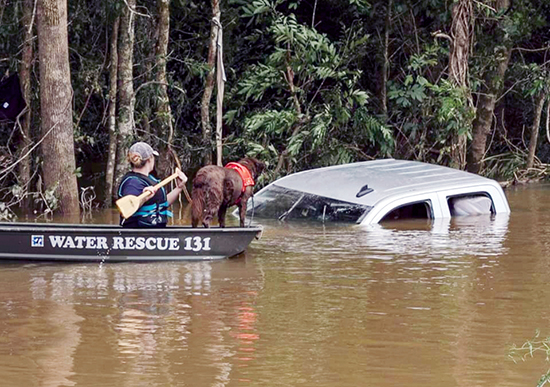
“We have searched a burnt house that somebody was suspected to have been murdered at and Remington assisted in locating the exact room where the person died,” Crivelli said.
“We deployed during Hurricane Harvey and searched in neighborhoods for anybody who could have been deceased,” she said. “Luckily, we didn’t have to locate anybody during Hurricane Harvey.”
In addition to this work, Remington also served as a mascot for New Caney Fire Department for several years and then for Navasota Fire Department until his cancer diagnosis and subsequent retirement.
“He would go to public relations events to greet members of the public,” Crivelli said. “Having a K-9 allowed firefighters to be more approachable; people or kids who might have too much anxiety to approach firefighters normally were always more comfortable with Remington around.
“He also was a great comfort after making tough calls,” she said. “We would come back from a CPR call or a fatality wreck and it was interesting to see Remington go up to all the firefighters and let them pet him. He knew when people needed loving from a big furry teddy bear. Even on searches, he would comfort the searchers, as well as the victim’s family.
“That’s what I miss most with him being retired,” Crivelli said. “He was a comfort dog more than a search dog at times.”
Fighting For Remington
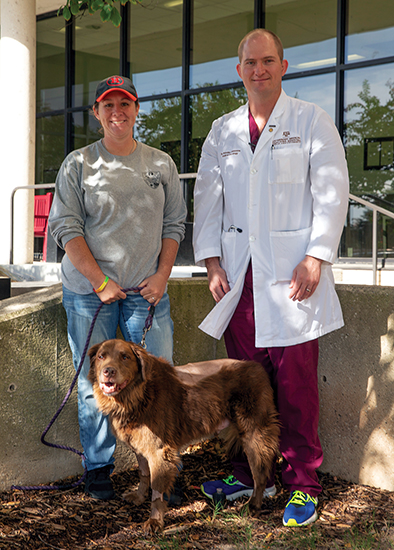
Remington’s tumor ran from the spinal canal to where the femoral nerve entered his right hind leg, causing him significant pain and requiring an intensive surgery of several hours for removal.
“This type of tumor is not very common but often misdiagnosed early on because initially, the signs are so gray,” said Dr. Brandan Wustefeld-Janssens, an assistant professor of surgical oncology. “It’s very common for these dogs to be lame for up to six months and have several rounds of X-rays, yet their veterinarians never find anything wrong. Eventually, when they come in here, they are very painful or the atrophy is so severe that it is now obvious.”
Crivelli, a cancer survivor herself, knew that Remington had more life in him and deserved the opportunity to beat his cancer.
“His job was to assist families and law enforcement with justice by helping provide answers,” she said. “He fought for those who couldn’t fight, so I had to give him a chance to fight for himself.”
Wustefeld-Janssens and a team of oncologists and neurologists removed the right side of Remington’s pelvis and his leg, opened the last three intervertebral spaces, and cut the femoral nerve as close to the spinal cord as possible.
“The cutting of the nerve is a really important step because, number one, we hope to remove the entire tumor, and, two, if there are no pain signals back to the spinal cord, these dogs feel much better,” Wustefeld-Janssens said.
After surgery, Remington recovered quickly and was soon cruising on three legs. As is typical for dogs who have undergone an amputation, he improved greatly once the source of his pain was gone.
“Dogs are incredible in that we can remove half of Remington’s pelvis and a big part of his back, and then two weeks later he’s running and jumping over small walls,” Wustefeld-Janssens said.
Supporting Our K-9 Heroes
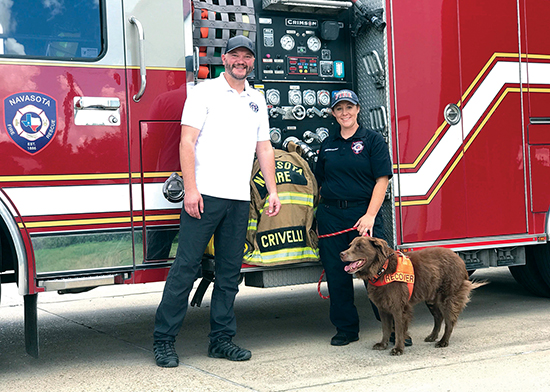
Luckily, Crivelli wasn’t alone in her support for Remington. After he was diagnosed, she reached out to Project K-9 Hero, a national nonprofit organization that helps fund medical care for retired police K-9s and military working dogs.
“I purchased a bag of Sport dog food and on the back of it was a story about Project K-9 Hero,” Crivelli said. “It’s for police and military dogs, but Remington’s a search and fire dog. I thought, ‘I’ll just try,’ so I filled out their application and two hours later I got a call from the founder, Jason Johnson, who said Remington was accepted to the program.”
Project K-9 Hero covered Remington’s full surgery cost with funds raised entirely through donations. As a K-9 Hero, Remington will also receive free food and medical care for the rest of his life.
“We felt that because of his age and because of how much life he had left in him, providing the surgery was going to allow him to live a high-quality life for the next couple years, hopefully,” Johnson said. “We’re honored to serve heroes like Remington, heroes who dedicated their careers to protecting our communities.”
Semi-retirement
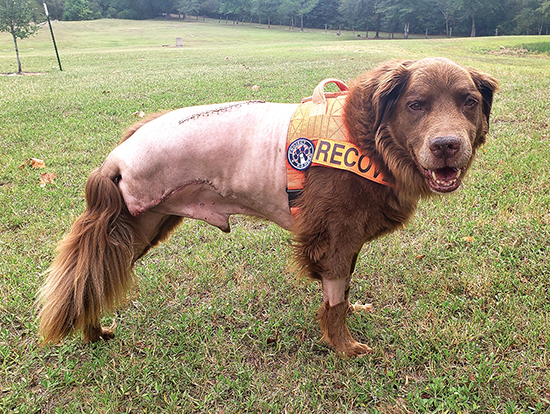
With 34 deployments and six confirmed finds on his résumé, Remington has earned the right to a relaxing semi-retirement from his search and recovery career.
He now spends most of his time at home with Crivelli’s family, while continuing to greet citizens and help the Navasota Fire Department with public relations. He also is serving as a Project K-9 Hero representative to help other K-9s receive the same support he did.
“I’m grateful for Texas A&M surgeons, students, and technicians, and for Project K-9 Hero’s financial support,” Crivelli said. “I feel I made the right decision to have a very major surgery done. I don’t think he would’ve survived this surgery if we went anywhere else.
“Remington appears to be feeling better than he has in years,” Crivelli said. “He is playing ball, swimming, and just loving life.”
###
Note: This story originally appeared in the Spring 2020 edition of CVM Today.
For more information about the Texas A&M College of Veterinary Medicine & Biomedical Sciences, please visit our website at vetmed.tamu.edu or join us on Facebook, Instagram, and Twitter.
Contact Information: Jennifer Gauntt, Director of Communications, Texas A&M College of Veterinary Medicine & Biomedical Sciences; jgauntt@cvm.tamu.edu; 979-862-4216


